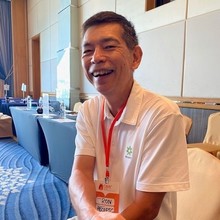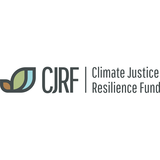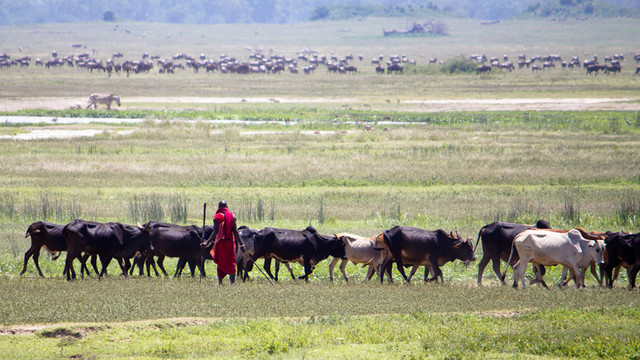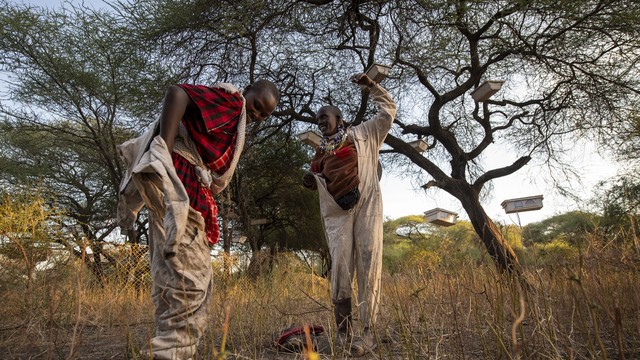CBA17: event highlights
The 17th International Conference on Community-Based Adaptation to Climate Change (CBA17) took place in Bangkok, Thailand from 22-25 May, 2023. Practitioners, grassroots representatives, local and national government planners, policymakers and donors discussed how locally led action can drive a climate-resilient future. This page contains updates direct from the event.

Participants from around the world get together in person at CBA17, Bangkok, Thailand (Photo: IIED)
The 17th International Conference on Community-Based Adaptation to Climate Change (CBA17) has finished in Bangkok, Thailand.
For nearly 20 years, CBA has led the way in bringing together diverse actors from around the world to learn and share the latest innovations for arming local communities with the tools, skills and knowledge they need to adapt to climate change.

The conference is also a crucial forum to discuss, debate and find practical ways to tackle the biggest blockers and barriers for advancing locally led adaptation. See the full CBA17 agenda.
CBA17 brought together over 200 practitioners, community representatives, local and national government planners, policymakers and donors from 55 countries.
Every day we updated this page with the event's highlights.
Day 4
That's a wrap on another CBA conference!
Another CBA conference has come to a close. The closing panel was expertly facilitated by Saleemul Huq, from ICCCAD, and featured speakers from each region in the global South: Victoria Matusevich of Fundación Avina in Argentina; Manibuka Terikiai of Live and Learn Environmental Education from the Republic of Kiribati; Kamila Gojobe, Muungano Wa Wanavijiji in Kenya; and Arti Indallah Tjakranegara from Yayasan Hivos, Indonesia.
Saleemul Huq, ICCCADEmpathy can do a lot more than money. It’s not something that a donor gives us, we give it to each other.

CBA17 closing panel (Photo: IIED)
Some of the panellists' reflections from the conference were:
"We have to be bold, and we have to trust one another – we’re all going in the same direction for what we want to achieve. We have to stop aiming for perfect solutions and learn by doing, and embrace the idea that we’ll make mistakes along the way."
"In our islands, the youth are not decision-makers, but at CBA we’re told that youth are important and can lead us for the future."
"I wish we had more youth here to showcase our actions and so we can learn from each other!"
"Everyone here has the intention to support LLA and to put local people in the driving seat. And we’ve shown each other empathy for the last four days. We now need to negotiate with our boss, our organisation, our government to share all that..."
Watch out for the CBA17 key messages shortly.
Which adaptation project impressed in the Dragon’s Den?
In the ever-popular CBA Dragons’ Den led by the Global Resilience Partnership, participants learn how to develop powerful pitches for their adaptation projects and present these to a group of people with donor or investment experience. As part of the process, participants use a range of frameworks and tools. These equip participants with the skills including how to formulate a bankable business proposition, expert tricks to sharpen their pitch and tips for making projects scalable.
In a competition-style plenary session participants presented their ideas to the ‘dragons’. Those grilling the CBA17 investment hopefuls were Demetrio Innocenti of the Green Climate Fund; Farzana Sultana, development advisor at the High Commission of Canada to Bangladesh; Charles Yu, technical specialist in climate finance and investment at UNDP.
The panel of dragons assessed the merits and viability of the pitches, seen through the eyes of investors. After offering feedback and guidance on funding options they picked a winner: Zahid Shashoto of Uttaran in Bangladesh won best business case for his ambitious project ‘The Drop’, which will enable fair and sustainable access to water in Bangladesh.
The three other participants, Theresa Carampatana of United Libis Community in Manila, Philippines; Subash Baral of Nepal; and Nicera Wanjiru of Kibera informal settlement, Kenya, all won for environmental impact. As a prize all four participants have been offered full mentoring from the Global Resilience Partnership. Congratulations to all the participants!

“I’ve learnt a lot from climate finance experts, particularly about the biggest problems with the climate finance system and about the roles of different types of intermediaries in getting finance direct to local communities.” Ummay Asma Bhuyan, Friendship

"A highlight for me was the session looking at the 15 biggest barriers to locally led adaptation. We discussed lack of long-term planning as one obstacle: we might be implementing projects but we’re failing to track back and analyse the project impacts. The importance of addressing this really hit me in that session.” Rafid Khan, BRAC

“There have been many great moments at CBA17 but for me the Dragon’s Den capped it! We’ve talked a lot this week about the need for innovative ways of building community capacity so seeing these fantastic community-based business pitches was a great way to end the event.” UnaMay Gordon, climate change and development consultant
Innovation to impact: localising technology
This parallel session hosted by the Asian Disaster Preparedness Centre (ADPC) and Friendship NGO intentionally did not give a definition of innovation, rather they allowed the session to explore what innovation means at the local level.
The session opened with a keynote address from the deputy governor of Bangkok, Dr Tavida Kamolvej, a disaster resilience specialist who oversees much of the city’s planning and infrastructure. She described a variety of innovations – both high-tech and analogue – that the city is using to keep its citizens safe, access healthcare and more.
She gave the example of the Fondue app where people can report complaints about issues in their neighbourhood and the local district must respond in 24 hours. They had 300,000 complaints in the first year and resolved 200,000 of them.

Dr Tavida Kamolvej, deputy governor of Bangkok (Photo: IIED)
Dr Kamolvej commented: “Innovation isn't just solar panels, it's not just building design – it's how you use it to benefit the people.” She also demonstrated how it has allowed her to negotiate with other local agencies to make changes and improvements. Through using air quality sensors to measure air pollution, they’re able to work with other local agencies to ensure that cars in the city are less polluting.
She described how Bangkok is using data mapping to measure its green space, as part of the governor’s green access and tree-planting goals. Through data mapping they also saw where there are fire risks, which led to working with the water agency to install more fire hydrants. She shared the value of learning from some innovations that weren’t totally successful, “when you experiment, anything that goes wrong is new knowledge".
These urban innovations were positioned against the rural perspective from Bangladesh, where Friendship NGO has been working on preparedness, response and resilience with NGOs, communities and local governments. Bangladesh suffers from poverty, which is exacerbated by disasters and climate impacts. And since their context is very different to Bangkok, the innovations come in a different form – but still involve mapping and citizen agency.
Communities come together to understand their own risks and explore solutions together. Some of the innovative solutions they’ve come up with are new forms of sustainable house building, mangrove reforestation, and schools that can be dismantled when floods approach.
All of the innovations discussed in the session were context specific and at different levels, but all worked – and when they didn’t work, they made a new plan.
CBA conversations: how can we get private sector finance flowing to LLA?
A burning and persistent question coming up during climate finance conversations at CBA17 is: how can we unlock private sector investment for locally led adaptation?
We talked to Daniel Peniston of Abt Associates, a global research and consulting firm that implements projects for donor agencies and private foundations. The organisation has offices in over 40 countries with projects across multiple sectors, and is known for its rigorous, evidence-based, and multi-disciplinary approach to tackling complex, global problems.
Daniel Peniston of Abt Associates in conversation with Suhsila Pandit, CBA17 programme co-lead (Photo: IIED)
Day 3
Every voice counts: decolonising climate action through equitable partnerships
Decolonising climate action is one of five themes at CBA17. In a session led by SDI-Kenya and IIED, we started the discussion about how to create a safe space, why we're here, to be kind and acknowledge that we might be uncomfortable.
As a warm-up, participants were asked to select which category of organisation they belong to. The vast majority in the room were international NGOs, which we acknowledged is a challenge at a conference that is meant to be community-based. This also raised the question of who decided to come to the conference themselves: participants were asked to acknowledge who's actually in the room and recognise who has agency over their decisions to attend.
The wider discussion was opened with a video message from Joe Muturi, president of Slum Dwellers International. He asked:
How do we change the narrative? And amplify the discussions, and resilience strategies that communities are using and have been using for many years?
In group discussions we were asked to leave one seat vacant, to represent the communities that are not here, and we were asked to think about what their experience might be. At tables we discussed four challenging questions:
- From your organisation perspective, how do colonial practices manifest in climate partnerships between organisations with different levels of power and resources?
- What barriers or challenges has your organisation faced to establish equitable partnerships with others?
- How has your organisation overcome barriers or challenges to equitable partnerships? What enablers, changes are needed to decolonise partnerships?
- What examples and initiatives can you share of equitable partnerships?
The questions were different at each table, but the answers that the groups came up with had the same themes. Partnerships between organisations across the global North and South, and from NGOs to donors to community organisations, suffer from a lack of trust.
There is gatekeeping on who holds knowledge, good practice and funding, as well as preconceived notions of what is acceptable knowledge or language. Organisations and individuals work in silos, which leads to a lack of understanding of local contexts.
Despite so many barriers however, there are solutions. We need to rethink our ways of working to break down silos and to reduce hierarchy within organisations and communities.
We must highlight good practice through increasing visibility of local partners. We have to stop gatekeeping good ideas and good practice and give local partners access to the same resources as INGOs. We must rethink how we work with donors on all levels, and not be donor driven.
And finally, we must acknowledge Indigenous knowledge – local people know their contexts best and have solutions.
Skill-share: practical tools for better locally led adaptation
In the CBA17 ‘skill-share’ sessions, delegates share a specific tool, skill or specialist knowledge with others seeking to acquire or strengthen their own knowledge in that area. The sessions bring participants together on an equal footing, regardless of background or education.
Mpho Tapela of Youth Unlimited Network is a social and behaviour change specialist, working with people with disabilities.
Mpho’s skill-share explored how to make disability inclusion an integral part of locally led adaptation.
The session began by establishing how structural inequality creates discrimination against people with disabilities. The group then pooled practical ways – all largely possible on little or no budget – to support inclusion of people with disabilities in climate adaptation projects. Ideas included consulting and engaging with specialist disability associations, and making project information, particularly digital content, accessible to people with disabilities.
CBA17 marketplace: trading ideas
CBA17 features a 'marketplace' where participants present innovative projects, case studies and tools for other delegates to learn from and be inspired by.
Juel Mahmud, programme coordinator at the International Centre for Climate Change and Development (ICCCAD) in Bangladesh, shared the initiative of climate-resilient migrant-friendly towns.
These towns seek to address the dual problem of climate change and the rising number of people displaced by climate impacts – flowing both from within Bangladesh and from neighbouring countries.
Around 13 million people within Bangladesh are likely to be displaced by 2050. High numbers of people are being driven from coastal areas, hit particularly hard by climate impacts such as cyclones, storm surges, sea-level rise, flooding, erosion, land degradation, high levels of saline contamination and subsidence.
The vast majority of migrants head for Dhaka and the country’s other major cities.
"Climate-resilient migrant-friendly towns are being introduced in Bangladesh’s secondary towns. They are set up to welcome and provide security, livelihood support and shelter to climate-induced migrants. Dispersing the massive influx of migrants away from Dhaka eases the growing pressure on the country’s urban hotspots."
Day 2
Talanoa: fixing the climate finance system
A CBA17 highlight was a ‘Talanoa’ exploring what role intermediaries should play in the climate finance system of the future.
Talanoa is a Pacific word to describe a traditional dialogue. These open and frank discussions are designed to solve the trickiest of challenges in a peaceful and highly participatory way.
Before getting into the dialogue details, Christopher Bartlett of the government of Vanuatu set out the principles of a Talanoa. These principles are sacred to the process and key to its success: everyone is invited; equality is paramount - no voice is more or less important than another; direct confrontation is not allowed – the dialogue must remain constructive and forward-looking.
The dialogue set out to examine the ‘journey’ of climate finance – from donors through to intermediaries and down to the local level.
Currently, the climate finance system is unfit for purpose: not enough money is reaching local communities. We need to fix this system to put more climate finance into local hands for local adaptation priorities.
The Talanoa set three guiding questions: Where are we? Where do we want to go? How do we get there?
Groups huddled in circles. Here were some positive suggestions and solutions about the future role of intermediaries that emerged from the lively and frank discussions:
- The climate finance system isn’t working: intermediaries can move forward by taking ownership of failure and learning from our mistakes
- Be ready to engage more with politicians – from members of parliament to government ministers – about the strategic direction of where climate finance goes
- Think long-term: recognise the need for patient and predictable funding
- Work towards the ultimate goal of ending the role of intermediaries. But to remove intermediaries as fund managers completely will call for trusting in lived experience and giving access to local leadership and local networks
Participants in a Talanoa circle (Photo: IIED)
Got a climate finance complaint? Speak to the complaints officer!
The Talanoa called for peaceful, constructive, solutions-focused dialogue concentrating on problem-fixing. The dialogue circles were not the place for grumbles!
But the climate finance system is riddled with problems – so CBA17 featured a climate finance complaints desk where specific issues and grievances relating to climate finance could be formally registered.
The climate finance complaints officer - IIED’s Clare Shakya – was ready to listen to complaints about where things in the climate finance systems are going wrong.
Complaints logged included:
- Local knowledge: why aren’t community voices and knowledge systems being recognised?
- Representation: organisations speaking on behalf of, or making decisions for, local communities must be truly representative organisations
- Blocks: donor systems are getting in the way, creating competition for funding and focusing on results over capabilities
- The UN needs assessment process: this is a UN programme generation machine and the whole process needs a rethink!
Bringing innovations to market
The CBA marketplace is back and buzzing with brilliant ideas! Market ‘stallholders’ showcase community-based approaches, solutions and innovations for responding to the impacts of climate change. It’s a quick-fire way to share tangible initiatives widely, and to meet others who are interested in similar approaches.
Thaowan Giorno of Raks Thai Foundation demonstrated an eight-step participatory land-use mapping process that is helping Indigenous hill tribe communities in the northern regions of Thailand secure land use rights.
The process brings communities and local government together to agree on a map that marks clear boundaries and sets agreements for how the land is going to be used.
Community participation lies at the heart of the process: after getting skilled up in map reading and how to use geographic information system (GIS) tools, communities can go out into the villages to map land plots, collect GPS coordinators and signpost what the different sections of the land should be used for. The next stage is getting agreement from local government.
Making the terrain visible is critical for effective adaptation. With knowledge about the terrain, decisions can be made around what adaptation interventions are needed. When this knowledge is built up within the community, community members themselves – who know the land best – can decide what adaptation approaches to take.
Once the land maps are validated and certified, they can be used by communities to support livelihoods, and to take good care of their natural resources
What’s your CBA17 wish?
Simple, tailored climate finance mechanisms
In plenary this morning participants were asked: what’s the one big thing you want to take away from CBA17?
Ronnakorn Triraganon is from the Center for People and Forests (RECOFTC), an international organisation working to secure social, economic and environmental benefits for forest communities in Asia and the Pacific.
Ronnakorn has come to CBA17 to learn more about developing finance mechanisms that can enable local people to access climate finance for adaptation.
He stressed the importance of tailored mechanisms, and ones that are straightforward for communities to work with:

“It’s key to recognise that with climate-finance mechanisms, one size doesn’t fit all; they need be workable in different contexts and different regions. And they need to be simple enough so communities themselves can take them forward. I’m looking forward to dialogue and discussion around how to develop these mechanisms.”
Mechanisms that are geared specifically to community-led climate adaptation are also key: “Too many climate finance mechanisms are centred around mitigation – we need more finance mechanisms that are specifically designed for community-based adaptation,” Ronnakorn added.
CBA conversations: what’s sparking your interest at CBA17?
Measuring the success of adaptation – but whose success?
Promboon Panitchpakdi is executive director of Raks Thai Foundation. Promboon joined the session 'Measuring LLA in practice: questions of accountability, agency, and tracking progress'.
Promboon is particularly interested in how the ‘success’ of local adaptation projects is measured:
“From the perspective of an intermediary, how can we be sure projects are on the right track?" he asked. "Many NGOs in the global South are working closely on locally led adaptation. But we need to think more carefully about how we measure the success of these projects. When we measure it, whose perspective are we measuring from? From the donor’s? Based on a logical framework? Or from the community’s perspective?
Promboon Panitchpakdi at the session 'Measuring LLA in practice: questions of accountability, agency, and tracking progress' (Photo: IIED)
Promboon Panitchpakdi, executive director of Raks Thai FoundationThis session gave me food for thought. It highlighted that when it comes to measuring the success of adaptation projects we need to consult directly with communities and be ready to listen very carefully. It is the communities that need to identify what are the measures of success.
Day 1
Parallel session: Measuring LLA in practice: accountability, agency and tracking progress
This highly interactive session covered the burning issues of how we measure system-level resilience; who to centre in monitoring, evaluation and learning (MEL) approaches; how to understand resilience as lived experience; and explored how to measure agency and to shift power. It was a big discussion! Using the “World Café” method, participants chose two topics that they wanted to discuss, and went to those tables, swapping halfway through the session.
The discussion was rich and varied, covering a lot of ground but all centring around who holds power and who has agency. Funders acknowledged that for them success is based on how money is being spent and whether it's being spent successfully, but not on how local recipients perceive success.
Examining MEL, the discussion centred around who is doing the measuring and for what purpose. When we talk about evidence – are we looking for evidence that we want to see or that is already there on the ground?
There are multiple development goals – the locally led adaptation principles is one, but there are also infrastructure, trade, biodiversity, and NDCs goals, just to name a few – a multiplicity of different agendas that come together. Individual people are affected by these intersecting global issues, and in this wider context who decides what knowledge counts? Who are the experts, and where does power and agency lie? The session asked many interesting questions that will spur more discussion throughout the week at CBA17 and beyond.
LDC Group chair opening address: CBA17 connects communities to key international policy spaces
The CBA17 opening plenary featured a video address by Madeleine Diouf Sarr, chair of the Least Developed Countries (LDC) Group negotiating bloc at the UN climate negotiations.
Diouf Sarr set CBA17 in the context of the deep climate crisis the whole world is now facing. Against this backdrop she highlighted the importance of CBA17 bringing together technical experience and expertise from across the globe, where diverse actors can debate, discuss and exchange how communities are leading from the front in adapting to the impacts of climate change.
She said: “CBA is an important space for practitioners to share their knowledge and learning about the practice of local adaptation. It brings together policymakers, donors, practitioners and researchers to share their expertise as well as further develop their own skills capabilities.”
But innovative approaches and dynamic solutions driven from the local level need funding; locally led action can only be truly effective if it is properly financed and communities are given the decision-making power to determine how climate finance is used.
Diouf Sarr highlighted the bold and ambitious call of the LDC Initiative for Effective Adaptation and Resilience (LIFE-AR) for at least 70% of climate finance flows to support local action by 2030.
CBA17 is a key opportunity for getting local-level adaptation on the international climate-change agenda. Diouf Sarr shared how CBA17 fits into a sequence of crucial international climate policy moments: "At the upcoming UN climate negotiations in Bonn the LDCs will push hard for more climate finance to flow to local adaptation. At COP28 in Dubai, the global stocktake will continue to press for more equitable outcomes for the LDC countries in relation to climate finance, particularly for adaptation action.
Finalising the framework for the Global Goal on Adaptation and the effective operationalisation of the loss and damage fund will also be high on the agenda.

Madeleine Diouf Sarr, chair of the LDC Group at the UN climate negotiations (Image: IIED)
COVID-19 and climate change: showing the power of community
During the COVID-19 pandemic, CBA went virtual; CBA17 is the first in-person conference since 2019. Addressing participants, CBA17 programme co-lead Sushila Pandit drew parallels between COVID-19 and the climate crisis.
"COVID confirmed for us what we already knew: when there is a crisis, local people have the innovation to take care of themselves and their communities. The same goes for action on adaptation. We can’t rely on global discussions and decisions when urgent and immediate action is needed."
Pandit called on the local leadership and community action around adaptation to be recognised and respected. "This knowledge and expertise needs to be put on an equal footing and recognised across all global platforms. CBA17 is an opportunity to bring lived experience and locally-tested knowledge from communities to the world.”
What’s your big question? What answers are you looking for at CBA17?
CBA17 is a dynamic, interactive space that encourages frank and open debate. No question is out of bounds!
Through a Mentimeter poll we asked participants for their burning questions around locally led adaptation that they would like to be addressed in the coming four days.
What are the challenges to locally led adaptation? What at the barriers? What’s working? What isn’t?
Here were some questions from the floor:
- How can funders better ensure that climate finance reaches the most at-risk and in-need communities and groups?
- How do we ensure adaptation is *really* locally led? What locally led adaptation innovations are out there and what can we learn from these innovations?
- How do we ensure that youth-led adaptation projects get the attention and the funding they deserve?
- How can power dynamics and inequities be addressed through locally led adaptation?
- We have been talking about these issues around locally led adaptation for a long time. Why is action so slow, what can we do to make real change?
- What does practical implementation of locally led adaptation look like in different contexts – in urban settings, in fragile states, and in nature. What’s similar, what’s different?
Shifting the power balance
The panel during the opening address dug into some of these pressing questions. IIED's climate change director Clare Shakya was joined by Jesse DeMaria-Kinney, head of secretariat at the Adaptation Research Alliance; Omer van Renterghem, theme expert on land, water and ecosystems at the Ministry of Foreign Affairs, Netherlands; and Susan Nanduddu, executive director of the African Centre for Trade and Development.
They discussed some of the challenges from their different perspectives – highlighting that power dynamics need to shift, and that project monitoring and evaluation needs to respond to local needs much more directly.
Both Nanduddu and van Renterghem also called for getting away from a limiting ‘projectised approach’.
The discussion triggered yet more questions: how do we achieve downward as well as upward accountability? We need to be honest – what can we do to deliver transformational change? And what do we do when we can't!? How do we collectively demonstrate what works? And how do we influence others?
We’ll being finding answers to these and many more questions over the coming four days.

Panel with, from left, IIED climate change director Clare Shakya; Omer van Renterghem, theme expert on land, water and ecosystems at the Ministry of Foreign Affairs, Netherlands; Susan Nanduddu, executive director of the African Centre for Trade and Development; and Jesse DeMaria-Kinney, head of secretariat at the Adaptation Research Alliance (Photo: IIED)
Who’s joining CBA17?
Lynn Modester is a coordinator with Green Africa Youth Organization and is here at CBA17 looking for answers for how to get more attention on youth-led adaptation projects – and for ways for these projects to attract more funding.
“I’ve come to CBA17 to find out more about how youth-based adaptation can be uplifted and amplified. It’s not a case of needing to tell young people how to do adaptation – they are already doing what’s needed on the ground! It’s around amplification and youth-led projects getting the profile they deserve.”
Sheen Alexandre Tato is a programme officer with VSO in the Philippines. Sheen works with Indigenous communities and is keen to share how these communities are using technologies to adapt to the impacts of climate change.
Sheen is hoping for the knowledge and learning to flow both ways...

As well as sharing these technologies, I’m hoping to get ideas, approaches, solutions from other practitioners at CBA17 and take these back to the Indigenous communities we work with.
– Sheen Alexandre Tato, programme officer, VSO Philippines
Pre-CBA meet-and-greets
Meet-and-greets are a good way for conference participants to introduce themselves ahead of the conference, to make connections, and to re-connect.
Obed Koringo,of CARE International, Kenya; Saief Manzoor-Al-Islam, of Water Aid Bangladesh; and Anne Schulthess from IIED met ahead of the conference for a brief discussion. Obed and Anne realised that they had met at a previous CBA conference, and Saief commented that he was excited to be participating in his first in-person CBA after previously joining online.
The group discussed what motivated them to attend CBA17: in Saief’s case it is an opportunity to share the projects he’s working on, to learn from the grassroots and to hear the voices of communities.
Obed is excited to be co-hosting a session with ICCCAD that will showcase innovative approaches to women’s empowerment for climate resilience.

Three CBA17 participants meet up online in advance of the conference (Image: IIED)
And he is looking forward to co-hosting a session with Farmers’ Voice, Bangladesh, featuring locally-owned, innovative solutions that have contributed to building community resilience in Niger and Bangladesh.
The group discussed the CBA17 themes and noted that this year there is no specific policy theme, but with the conference exploring how putting the principles for locally led adaptation into practice, discussions how climate adaptation policy can work for local communities will run throughout the four-day event.
Contact
For all enquiries, please contact cbaconference@iied.org.
About the organisers
CBA17 is organised by host partners the Bill & Melinda Gates Foundation, the International Institute for Environment and Development (IIED), the Global Resilience Partnership, the Asian Disaster Preparedness Center, the World Bank, Practical Action and the Green Africa Youth Organisation, in collaboration with contributing partners Raks Thai, ACTADE, Climate-KIC, ICCCAD, SDI Kenya, VSO, the Adaptation Research Alliance, the Climate Justice Resilience Fund, and CARE.



















